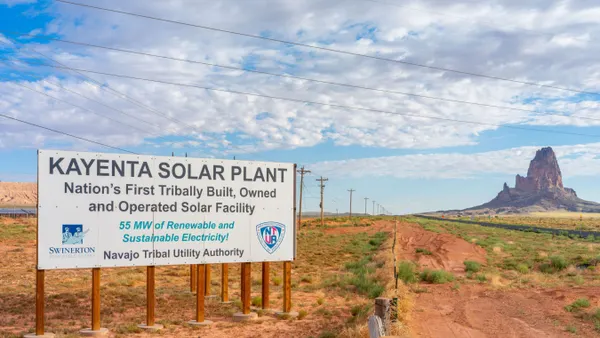Dive Brief:
- Connecticut lawmakers on Wednesday passed a wide-ranging energy policy bill, the most significant in more than five years, but the details of how the new law will handle net metering have divided advocates and fractured coalitions, according to local media.
- The legislation implements the state's 2018 Comprehensive Energy Strategy (CES), which was finalized earlier this year. Among other initiatives, the bill increases the Renewable Portfolio Standard (RPS) to 40% and launches a statewide shared clean energy program aimed at income-challenged customers.
- But some lawmakers acknowledge voting for a flawed bill, and typically-aligned clean energy advocates were split. The bill eliminates net metering and replaces it with with two choices, both of which include rates set by the Public Utilities Regulatory Authority.
Dive Insight:
Gov. Dannel Malloy, D, hailed the bill's passage and is expected to sign it, but not everyone is enthusiastic.
"This is a good and important piece of legislation,” Malloy said, adding that the state's legislature "took real steps toward reducing our overall emissions and creating good jobs in the green economy, all while decreasing costs for ratepayers."
Key provisions of the bill include the RPS increase, and the creation of successor programs for commercial, industrial and residential efforts to provide sustainable growth of renewables. The new programs will be needed due to the expiration of some initiatives, including the Low-Emission Renewable Energy Credits, Zero-Emission Renewable Energy Credits and Solar Home Renewable Credits.
The bill "expands opportunities for municipalities, state agencies, and agricultural customers to deploy renewables under an auction structure," Malloy said.
Senate Bill 9, "An Act Concerning Connecticut’s Energy Future," passed the House 100-45 and the Senate 29-3.
Northeast Clean Energy Council President Peter Rothstein acknowledged the bill was a mixed bag. SB 9 includes "a robust expansion" of the state's renewable goals, but the bill includes "counterproductive provisions that will significantly harm the state’s rooftop solar market," he said in a statement.
The bill would change net metering in the state and replace it with what is known as a "buy-all-sell-all" incentive.
The structure would remunerate distributed generation owners at approximately the wholesale rate for exported energy and charge them the retail rate for electricity. The bill orders a PURA proceeding to set the precise value.
Rothstein explained that the bill limits customers’ ability to use the power they generate by requiring that it be credited as it’s generated or within a day.
"Unless the utilities provide customers with metering and communications, and time varying rates, which will give them the information they need to match usage to production, customers will not be able to manage and reduce their energy costs by adopting solar," he said.
The Northeast Clean Energy Council urged the state's Department of Energy and Environmental Protection and PURA, which will implement the new solar program, to establish "cost-effective, fair solar compensation and rate structures that will enable clean energy and solar to continue to flourish."














